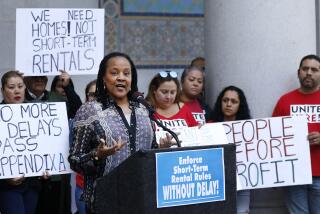Key to Lease Agreements
- Share via
Tenants will be glad to hear this. There are some things landlords are not legally allowed to do, even if the written lease says they can do them--like violate your right to privacy or take away your right to sue.
Many landlords use form leases from a stationary store or a trade association. Besides containing print so tiny that they are hard to read, and language so legalistic that they are impossible to understand, sometimes the leases contain provisions that are legally worthless. (Although if you don’t know that, they may serve a purpose.)
Some Provisions Void
The state Legislature has passed laws that make certain lease provisions void as being against public policy. In other words, even if the lease says one thing and you signed it, a court will refuse to enforce it.
For example, even if the lease says the landlord can enter the premises at any time, without warning, the law won’t permit it. The Civil Code sets specific limits on the right of a landlord to enter a rented dwelling, and Section 1953 says those limits cannot be waived or modified. Just so you know, a landlord can enter your property in the case of an emergency or if you’ve “abandoned or surrendered the premises.” (That’s legalese for having skipped out.) The landlord can also enter the premises pursuant to a court order, in order to make necessary or agreed repairs or improvements, or to show the place to prospective tenants or workers.
If the landlord is coming in to make repairs or show the place, he must give you reasonable notice. The law deems 24 hours as reasonable notice, although less notice may be acceptable depending on the circumstances.
Another example of a void provision is one that takes away your procedural rights in a lawsuit. You simply don’t lose your legal right to a notice or a hearing simply because the lease says you do.
A landlord is also legally required to maintain the premises up to bare legal minimums. If he or she fails to do so and won’t make needed repairs, the law allows a tenant to make the repairs and deduct the cost of the repairs from the rent, under certain conditions. (For example, the problem must be so serious that it violates health or safety standards, you can’t spend more than one month’s rent, and you must give the landlord reasonable notice--usually at least 30 days. For details, read Section 1942 of the Civil Code.)
A lease cannot waive or modify these “repair and deduct” rights unless you have negotiated reduced rent in exchange for your agreement to take care of maintaining the property.
Legal Evictions
A lease cannot give a landlord the right to throw out a tenant without going to court and following the eviction procedures set by law.
And a provision in a lease that says the landlord does not have to exercise reasonable care to prevent personal injury or property damage is also unenforceable--though it may convince you not to sue if you or your guests were injured as a result of the landlord’s negligence and you didn’t know better.
Your landlord also cannot use a “no pets” provision in a lease to prevent a blind, deaf or otherwise handicapped person from having a trained service dog on the premises.
So don’t let everything you read in a lease intimidate, confuse or mislead you. Some of it may not even be real--legally, that is.
More to Read
Inside the business of entertainment
The Wide Shot brings you news, analysis and insights on everything from streaming wars to production — and what it all means for the future.
You may occasionally receive promotional content from the Los Angeles Times.










